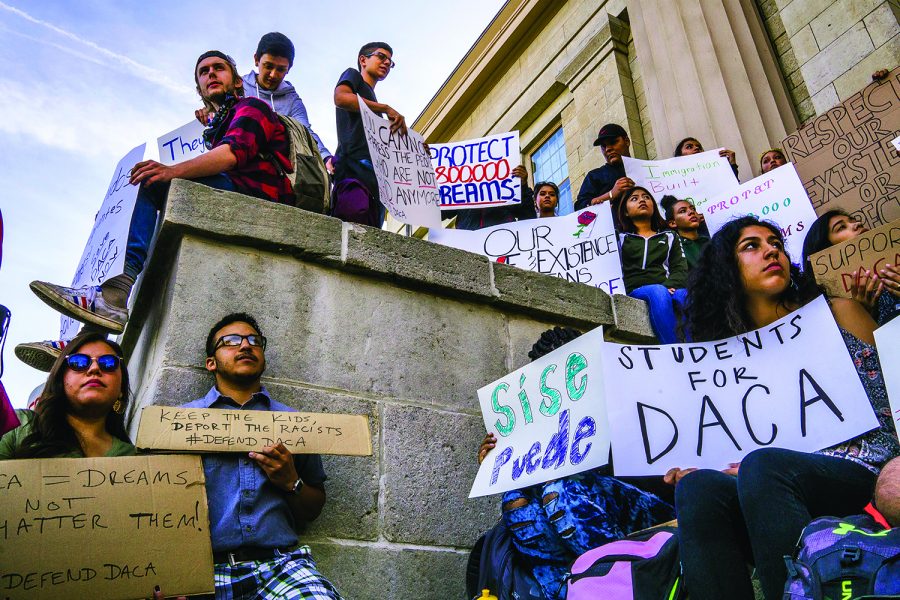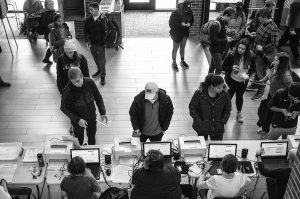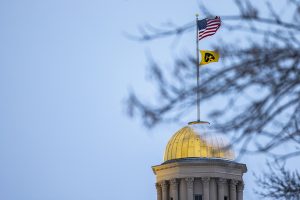UI Dreamers remain safe but want permanent solution
UI students protected under DACA breathed a sigh of relief Tuesday when the Supreme Court did not take action. However, a more permanent immigration solution is sought after by many.
Supporters hold signs at the Old Capitol Building on Thursday, Sept. 7, 2017. The recent decision regarding DACA’s rescission has been a highly controversial issue in national politics.
January 24, 2019
Hawkeye Dreamers will not have to worry about leaving the U.S. for at least several more months after the Supreme Court on Tuesday took no action on a case concerning the legality of the Trump administration’s move to end the Obama-era executive directive.
The Deferred Action for Childhood Arrivals program will remain in effect until at least the court’s next term in the fall as a result of the decision.
The decision comes amid attempts by the Trump administration to use DACA as a bargaining chip in its efforts to hammer out a deal to end the government shutdown. The shutdown is entering its 35th day as Trump and Democratic congressional leaders continue a dispute over funding for Trump’s proposed U.S.-Mexico border wall.
RELATED: UI community ‘stands in solidarity’ with DACA students
Then-President Obama, through the executive directive, put DACA in place on June 15, 2012. In September 2017, President Trump moved to rescind the program — the program has been kept alive by legal challenges.
Under the program, individuals who came to the U.S. as children and met certain requirements may request deferred removal action for two years. The action is renewable and also included eligibility for work authorization.
“We are in limbo,” DREAM Iowa cofounder Monica Reyes said. “Those who are currently under DACA are able to renew, but at the same time there is a bigger crowd growing, hoping DACA or something greater will come along for younger, undocumented immigrants.”
There are nearly 700,000 individuals currently protected under DACA in the U.S. Of those, around 2,500 reside in Iowa, according to a report by Citizenship & Immigration.
There is no official number of University of Iowa DACA recipients because the university does not inquire about students’ immigration status, The Daily Iowan has previously reported. If students wish to reach out to the UI, however, there are safe spaces on campus to speak about resources and family circumstances.
RELATED: Harreld talks DACA, tuition increases
UI President Bruce Harreld has previously stated his opposition to the end of the DACA program. He and shared-governance leaders have expressed their support for those affected.
“We actually have a Hawkeye DREAMers team that’s prepared to do anything necessary to help those impacted … anybody who has any specific needs: Come see us; we’re here to help,” Harreld said in a September 2017 interview with the DI.
In 2017, the Association of American Universities — a national organization of leading research universities — created a letter signed by members, presidents, and chancellors of universities around the country urging Congress to act to protect those under DACA and ensure they are able to remain in the U.S. without fear of deportation. Harreld signed it.
The Supreme Court’s decision is a sigh of relief for now, Reyes said, but DACA recipients are still hoping for a more permanent solution so they may remain in the U.S. safely and legally.
UI Student Government communications director Kristen Ahrens said in an email to the DI that the organization also continues to stand with members of DACA and their families in light of Tuesday’s Supreme Court action.
“We continue to offer our support to any and all DACA students who may be a part of our Hawkeye family. It is critical that all students, regardless of immigration status, feel safe and supported on campus,” the statement read. “While we are happy to see temporary protections, we continue to urge Congress to work towards a permanent solution for DACA students everywhere.”






